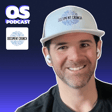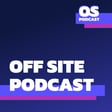Become a Creator today!Start creating today - Share your story with the world!
Start for free
00:00:00
00:00:01

Unlocking Career Success with a Mace Planning Director
With Jason out on paternity leave, Mike is back in the fray alongside Carlos as they speak to renowned planning director for Mace, Sam Doble.
The trio chart Sam's unique rise through the ranks across two disciplines, discuss why being patient is key to getting promoted, and give advice to any young professionals wanting to get ahead in construction.
Follow Carlos on Linkedin | Follow Jason on Linkedin | Check out Aphex
Transcript
Severe Motorbike Accident and Its Impact
00:00:00
Speaker
on a track day to Spain in the middle of February 2017 and um decided to throw myself off the motorbike, which resulted in me now permanently being in a wheelchair. So yeah, did ah did a proper job on myself, broke my back in five places, broke 14 ribs, punched both lungs, fractured my pelvis in three places, very nearly died. So yeah, quite thankful really to still be here.
Podcast Introduction and Host Update
00:00:28
Speaker
Welcome back to the Offsite podcast. So this week, Jason is off. He and his wife had just had their second baby. um Massive congratulations to them. I'm sure they'll be listening to this together in a few weeks' time. The second piece of great news ah this week is that we've got Mike back. Great to have you back on the show, mate. Thank you, mate. As I stepped in for you on parent duties, it were the bench is still not super deep with talent on the podcast. And so I've been welcome back for another run. I was worried when I was up that it was got a little bit too Australian with you and Jason kicking it about, but, uh, the feedbacks were pretty solid actually. So yeah, I think, uh, thank you very much. No, you will with Sam, you still got the majority here two to one. So I think the dynamics are right on UK versus odds. Yeah. Yeah. Yeah. We're not losing this battle.
Introducing Sam Doble and His Career in Construction
00:01:18
Speaker
Today, we are we've got a guest, and we're joined by Sam Doble. um Sam is currently the planning and project controls lead for MACE Infrastructure. um He started life as a construction manager at Langer Rourke, working on a bunch of schemes, including a Heathrow T2, Pembury Hospital, and Ascot Racecourse. A really impressive CV, especially when you realize he's done all of that from graduate in less than 15 years. So, Mike, I think it makes us look like underachievers. Sam, welcome to the show. How are you, mate? Thanks, guys. Yeah, yeah, good. Thanks. We'll be a bit hot, but ah yeah, pretty good. yeah Pleasure to be here. It's a bit sticky this week. Yeah, yeah the tough things, the headphones, right? It is starting to get sweatier than it starts to sound a bit funny, but ah yeah yeah, it's fine.
00:02:05
Speaker
ah Yeah, impressive trajectory on the CV. I've got to ask the question, starting as a construction manager as a graduate, that must be quite tough calling shots to guys on site when you're sort of a fresh-faced 20-year-old or whatever age you were when you left uni. What was that like? Yeah, blind enter. I think what age I would have been now, so, what, 22, 23, probably, coming onto my first... No, I was younger than that on my first construction site because that was Ascot race course while I was still at so so that uni doing a sandwich course. Yeah, that's a nice bit of experience then back at uni, and then was keen to get into work so I was it was a sponsored course as well that's why I ended up with Lang O'Rourke I was sponsored by Lang O'Rourke to go to uni so they handed me some beer money and that is meant to use for books and things but mostly beer.
00:02:48
Speaker
and walked straight into a job four days after graduating with them and started on a high security high spec MOD facility down in Crawley. So that was really cool, it was great to be on site and I think definitely that is the the biggest thing you know you're coming in fresh from university and you've got to gain the respect of people and I think people do listen to you but you have to you have to gain that trust and respect and They have to see that you're not just being a complete idiot. you know You're there to try and help and help them do their job.
Managing Projects at Heathrow and Pembury Hospital
00:03:15
Speaker
And yeah, it's just about personalities, isn't it? You you see all sorts of personalities on site. You see the old school shouting and screaming and bawling inside people. And then you get those that are much more amenable and ah there to sort of help you guys. So I definitely fall under that much more.
00:03:30
Speaker
amenable category, I'd say. So yeah, after that, moved on to Pembroke Hospital at Tunbridge Wells. Again, similar sort of role, but I'd progressed on and I'd actually completed the job. I was pretty much the last person there on that that last job. So I got to hand it all over with that line. So lots of nice, nice learning from that. moved on to Penmore Hospital, managed two of the floor levels there, and it was sort of like four prongs or wings of this hospital. So I had two levels I was looking after. That was quite an eye-opening job, one of the old PFI hospitals. So the program was kind of easy to achieve. There was lots of money made in it by Langaraw from my understanding. I think it was probably one of the last PFI schemes before they sort of dropped off the radar and stopped being funded.
00:04:12
Speaker
And all that so that was good job really enjoyed that one. And from there, I kind of fancied after quite a long commute, because I live over in in Surrey, quite a lot commuting to Crawley and then Tumbridge Wells was even further so decided I want to get a bit close to home. So we just picked up at that point, the terminal to a redevelopment. as part of Hetco, the Heathrow East Terminal Consortium, which was a joint venture between Langorok and Ferogio. Went on to that job and I was there for course three and a bit years and I did multiple roles through there. Started off, it was literally a mud pit in the ground. So I started off actually in the procurement and ah team, sort of seconded into them, helping write scopes and packages and start procuring and buying the packages along with the procurement team. So again, good learning there. And then I managed, sort of started, the things started to fall into place a bit really. I was
00:04:57
Speaker
was sort of number two manager on the the departures level at the start of it when the fit-out started um and I think something happened, I think it's one of the managers left, so the senior manager that was the construction manager at the time, I was a section manager for Langerol, he moved down to one of the other floors and the departures level was then left with me for a while and I thought this is a good opportunity so I just kind of got my head down and and drove and had a chat with the the project director there and said, look, you know just give me a chance. I can run this. don't Because it was all this old, we've got to recruit someone, bring someone else in. I said, no, give me a chance on it. and Come outside. I walked around once a week. You can tell me what you think doing well and not doing so well. And yeah, I fell into place then, really. so But and that was that was kind of the making of me there, I think.
Transition to MACE and Managing High-Risk Projects
00:05:44
Speaker
And then I pushed and said, right, can I have a promotion? And I ended up getting promoted. I was a construction manager.
00:05:50
Speaker
I had an opportunity because T2A was coming out to the end and I was like, okay, where do I, where do I see myself now? And I wanted to go up to project management. That was the next level, but I couldn't see that next step seemed to be a long jump with Langerog. You know, you went from, you went out to project leader essentially. And that to me, that was a, that was a big step. And they were keen on progressing people. And if you were good enough, you're old enough. And I really liked Ray O'Rourke's attitude on that, in fact, and which I still think is the manager today. But um it just seemed to be jump. So I had a friend working for MACE at the time. And he said, oh, well, don't you come over here. you know It's he's a better setup. I think you've got more opportunity. The company's growing. It's going well. So send us your CV. So I did. And then kind of went from there. I ended up getting a good offer to go over to MACE and um and join MACE in 2014. So yeah, I've been there just over 10 years now.
00:06:37
Speaker
joined them, worked on a project, it was for Sky, it was in Sky TV, BSky B, their headquarters in Osterley. That was quite an interesting one actually. The biggest sort of learning curve on that job was we had to pile for an energy center. And in doing so, some of the piles were within three meters of the main fiber optic network that comes out of the Sky headquarters or feeds kind of the world. And these high risk give it was high risk. And just to give you an idea, but they those cables were responsible for generating, getting on for 50 million pounds a day in revenue for Sky. So it pretty much would have wiped out the maze business had we decided to pop a piling rig through one of those. So yeah, anyway, digressing on that job. So yeah, carried on with that one, saw that one right through to the end. I managed to fit out on level zero and level one. um
Career Growth through Challenging Roles
00:07:28
Speaker
so level No, sorry, level one, level two, get it wrong. There's so two of the the office levels. and that but That was a 4,000 people office block with sort of counting facilities down at the ground floor and essentially big open plan office space. At this point, you've If you go all the way back to your early days at Langarauk, you've kind of done your your construction management, you spent time in logistics, you spent time in procurement, you're talking about high-risk activities here, fit-out building, and effectively civil. Was it a combination of all that plus you pushing for promotion that you think was part of the reason why you have driven up that tree pretty quickly? um Because it's kind of a combination of well-rounded experience, and if you don't ask, you don't get, and you're obviously just asking and pushing for things that you need on the way.
00:08:12
Speaker
Yeah, definitely. Don't ask, you don't get, I think, but also the one thing I found it was the same in Langorok and it's the same at MACE that the reward and recognition tends to follow the role you're doing. So unless you're taking on those challenging roles or taking on more responsibility, you don't tend to get anywhere. I mean, sometimes you will, but. Ultimately, I think it's about taking on that big challenge and looking to the next challenge and being seen as, oh, yeah, this person's quite keen. They were eager to progress. Let's give them a different role or let's let them take this on and not always manage other things on the side as well. I joined MACE others.
00:08:47
Speaker
Oh, sorry, Langa Rourke, I was an IIF trainer, so incident injury free trainer. So that was their sort of safety campaign. So I would train the workforce in that. So you could present it to the workforce, probably the hardest audience you can imagine, because no one wants to sit in a safety training course for three hours and answer questions. So quite good training, actually. and Yeah, I was always keen to do something else on the side. I think that that always helped. And yeah, so following on from Sky, I then decided I'd fancy to go back to the airport. So I had an opportunity to move back to the ah aviation sector at the time.
Adapting to New Roles Post-Accident
00:09:19
Speaker
and So rejoined back there in 2016 and managed to get over there as a project manager. So I had my own job. It was a five million pound job to take from from design. It was a full can store over at terminal five. So like the cans are those, you've probably seen me directly. Was that your first move into project manager there?
00:09:39
Speaker
Yeah. Yeah. So suddenly I'm then responsible for the whole job. I've got to manage the design, manage the design as many clients, stakeholders, all those interfaces. So it was, that was good. It was a nice experience, but on a small manageable job as well. And already others like, Oh, I want something bigger. Yeah. Start managing that job. And it was just about to go on site in, um, I'd gone away on a, uh, I was mad on my motorcycling when I went on a bike and trip on a track day to Spain in the middle of February 2017 and decided to throw myself off the motorbike, which resulted in me now permanently being in a wheelchair. Yeah, that was a bit of a fail. I was meant to come back that next week and actually start running that job. So it was going on to site.
00:10:21
Speaker
So yeah, I did a, did a proper job on myself. I broke my back in five places, broke ballteen ribs, punctured both lungs, fractured my pelvis in three places, very nearly died. Um, so yeah, quite thankful really to still be here. Um, so then that's obviously a little bit of time off work, as you can imagine. I was stuck out in Spain for a month until I was, um, being fit enough to fly back. I had an operation to fuse my spine back together. So yeah. Now. Now paralyzed from the chest down, just to sort of give you an idea, but very capable in a wheelchair. I get around everywhere. It doesn't, doesn't stop me as you probably saw Carlos when we now the other day. Um, and ended up with, I mean, I only wanted about nine months off work. I was really keen to come back later in 2017, but work was sort of struggling with how to bring you back. And they'd never seen anything like this. Someone goes on long-term sick, they tend to not come back, you know? Um, so they were like, okay, how do we, how do we get back in? So eventually it got me back in, in planning.
00:11:14
Speaker
So I'd weirdly done a little bit of planning back pre university days. I did three weeks at so sewage treatment works, working for a planner and hated it in all honesty. So when they said to me, Oh, you know, come back into planning, cause I was there thinking, I'll go back into project management. It'd be fine. It's all right. The airport, it's all quite accessible. Um, and look now coming to planning, you know, I think you you do well in there. So I was like, Oh, okay. Well, let's, let's go with it. See how we go. Just to touch on that slightly, um is it the role of the project manager and the business effectively saying it would be really difficult to do this role because of the accessibility issues? And then are they sort of suggesting planning because it's the more like what they feel is a more appropriate role given your circumstance?
00:11:58
Speaker
Yeah, I'd say so. And it does make sense when you look at it. You know, I can go out and site. The airport's really good where I work because airports generally are pretty accessible. So even the sites themselves are pretty good to get around. So I can go out and site. But yeah, it makes more sense to do a more desk-based job, I guess. And coming in with a construction background, it does really help in planning because of course you can put a meaningful plan together. Yeah, the best plan is... I've been there in delivered jobs for sure. Some planners are going to hate me for saying that, but I do think it's true. There's definitely some good truth in it, I would say. The best planners in my team, I've got a team now of 30 planners that I'm directly responsible for throughout the organizational tree. Then there's other projects that are indirectly reported to me on a month basis with additional planners.
00:12:48
Speaker
yeah the the best planners generally are those that have come in or have that construction background and understand construction jobs for sure it's definitely yeah yeah definitely my my view as well super impressive to go through something like that um and as you say after nine months being like i want to come back to work um so uh yeah like hats off for sure i don't think many people will be able to deal with that um as well as you have um yeah So how did you find the planning role then? So was this the, so May said, we'd like you to be a planner and you just said, right, screw it. Let's give it a go. Yeah, exactly. And well, I thought, you know, I'm getting back to work. That's the key thing for me. It was about getting back to normality. I kind of tried to just see everything as a challenge. And the next challenge was let's go back to work. You know, yeah, that, that again, I think having that mindset of always wanted to drive yourself, that really helps. And that certainly brought me on quite quickly. And I was.
00:13:38
Speaker
through rehab, I was the quickest person they'd ever had go through the rehab when I came back over to the UK and and ended up in Stanmore. I was through in seven weeks and a day to be exact. So I think the previous best was eight weeks. And I was going home at weekends after two weeks. So just to sort of, you know, go home, try things, get used to life in in a wheelchair and and then go back and then use what I'd learned with the occupational health and the physios to sort of say, okay, I need to practice this, need to work on that. So yeah, again, all the way through just drove myself. And I think that was the same thing we're planning. It was like, right, we're back to work. Let's learn a new role. Actually, it might be all right. Um, so, uh, while I didn't, while I sort of knew what I was doing on the newbie airport, I had to learn all the software and had to learn how to plan. And it wasn't like I hadn't planned before, but I was used to doing plans drawn down on an A3, um, plan of the site and say, right, we're going to work there. We're going to do that. So then it was, you need a doctorate to work P six anyway. Yeah, it is. It is a bit tricky, but yeah, so I guess over the course of I was lucky actually at the time that my boss and who's now retired. It was my position before and he spent a lot of time directly with me one to one, so I didn't go on any direct courses, but he would he would send me challenge and go, right, here's how you use it. Do this and then come back to me when you've done it. So started off in that respect, picked up the software and was like, OK, let's
Lead Planning Role at MACE
00:14:55
Speaker
let's do this now. Let's teach you this. So then I had a few buddies within
00:14:59
Speaker
the team who was sort of teaching me but various things. And yeah, so that was sort of middle of 2018, came in as planning, ah planning manager. I think, I think it was by, I got made up to senior planners who picked things up pretty quickly. I'd say within three months, I was pretty running running absolutely on my own. I think I ended up with running four jobs at one time actually was my sort of peak and yeah moved up to senior planning manager again me pushing going well you know can I be senior manager I think I'm I'm doing enough work now and yeah sure enough was recognized for it but yeah quite quickly went up to senior planner and then Covid came along and things kind of all changed from there. and
00:15:40
Speaker
obviously that the airport got massively hammered with yeah what happened with the pandemic. We went from overall in mace aviation and infrastructure and retail sectors as we were then. I think we went from about 230 odd staff down to 63. Not loads of people laid off but a lot of people redeployed across the business and I think they were quite lucky that the technology center with data centers had really picked up. So people were moving across the business but essentially it was just a core team of people. Yeah, that, that was quite, that was quite a challenge. I think there was 20 planners or so in the team in total. And then that dropped down to just six of us. And it came to the end of the 2020 and old boss Nigel at the time and had us all on a call and said, right, I just want to let you know, I'm retiring. And we were like, Oh God, blimey. Well, what's happening? He was taking over. is He's like, well, I don't know. It's, it's with the senior team.
00:16:30
Speaker
And I even wrote to him afterwards and said, look, if this there's anything I can help out with, I'm happy to take certain things on because ah I'd helped out when he'd been on holiday for, he used to go over to Australia to see a family over there. So, um he'd he'd leave certain things to me and I'd look after them. Just, it's like a sort of trusted person. And I said, you know, Yeah. I'll help out if there's anything you need or take on the dashboards, anything you want. Um, but I don't feel any, and he said to me, Oh, how'd you feel about taking over for a minute? I was like, no, I just couldn't do it. I've only been in planning for two and a half years. And this team have been, there's some people in the team have been there. So it's 20, 20 plus years at that point. I said, just doesn't feel right. I said, no, I don't think I'm the right person for the job and said, no, you you could do it. You could do it in any way. Brushed it off a couple of weeks when I got a phone call on the Friday afternoon saying, um, congratulations, you got my job.
00:17:18
Speaker
And I think I had the most sleepless nights over that weekend that I've ever had. I thought, no, this is just wrong. Someone's made a mistake here. So, yeah, literally from December 2020, I took over as planning lead and had a team of six and sort of built it up from there. Gradually now, as I say, teams grown as we came back from the pandemic, airport opened back up, jobs came back online, won the age seven framework, which is the next yeah five-year spend with Heathrow. loads of work there. um Yeah, the team is now 30 strong plus me. And on top of that, we've had more stuff coming. So we were just pretty much Heathrow and a tiny bit of Gatwick was our, our core work. And we had some retail stuff that kind of came to an end and they disbanded the retail part of the business that came under us. So that disappeared. We then became infrastructure as of January this year.
00:18:05
Speaker
took on the um responsibility for the HS2 projects that we've got. that So Euston Station, the joint venture with Maestro Gardus, and Curzon Street in Birmingham. And then, so they're, you know, major jobs, but they're not, they're sort of in, they're under our business unit. And like I say, these, the planning teams, they're great, but they they don't report directly to me. They're sort of, you know, in a small way responsible, but mostly for their reporting. It's not, if the jobs go wrong, it's not my problem, or is it? It's the important things. So yeah, now that there's probably about another 12 planners across those projects. And then there's, we've got Manchester Airport, there's two jobs we've got up there as part of the consultancy business that came into the construct business and under our sector as of May this year. So yeah, we've got work under Manchester as well. Contractors love to slice and dice and then re-slice and dice their divisions and sectors every few years. Yeah. Just give everyone guessing.
00:18:54
Speaker
No,
Career Progression and Team Building at MACE
00:18:55
Speaker
that's it. Well, it's been a big restructure of MACE over the last sort of six months to a year, you know, carving up the business and into more appropriate um uses. And now it's really properly split with construct, consult, and then, you know, construct is we build things, consult is consultancy, which is what MACE was obviously built on from from all the years back. So they've just broken the business up and spread the risk around a little bit, which seems sensible. But it's yeah it's meant our business units become huge. One of the things that you were talking about really struck a chord with me, you're talking about, I guess that personal drive that you had both kind of post accident in the rehabilitation to get better. But I was picking up that kind of thread, even when you were talking earlier of this.
00:19:37
Speaker
I guess, this balance of both ambition and patience. Sometimes people are really ambitious and that leads to kind of jumping around from role to role or company to company. But you sound like you're really like quite driven and ambitious, but also really patient. Like all the way through, you're talking about seeing out all those projects. And so, yeah, I was just interested to hear a bit more about how you strike that balance when you do obviously want to move up or broaden the remit whilst also maintaining that patience as well.
00:20:10
Speaker
Yeah, that's a good question, actually. I haven't really thought of the patient side. I i would say I've always been quite quite pushy and sometimes a bit impatient. But yeah, I guess there always has been an element of you have to be a bit patient. And yeah, there can be frustrations at times. And I've certainly gone through times where I felt, come on, this is time for promotion. I'm doing the job now. Why can't I have it? you know And it is waiting for the point that business can justify it as well, albeit you know you can sit there and say, well, that's not right. If you're doing the job, you should get rewarded for it. but I think it's, yeah, you have to have an element of patience, but also proof is in the pudding. Are you delivering on what you're doing? Are you taking on big challenges? And that's, um that's always been my i sort of thought on it, really. You've got to do the job before you can get rewarded for it as such.
00:20:56
Speaker
Yeah, definitely. It also sounds like, I guess, a lot of the time you're stepping outside of the role. Like there's the day job that you had at each role, but it seems like you're being a big team player the whole way through in terms of, yeah, what else can I actually do to help out this team that I feel like when senior people are seeing that, that does add to this. And obviously people actually like you, because it's back to that like amenable kind of profile where you communicate with people they enjoy spending time you and you're also there willingly trying to help to get better outcomes to put yourself in the right spot. Yeah, that's that's a good point as well. Actually, it's just resonated something with me that before I took over the team, it was it was a very sort of but well, there was no structure beneath the the lead planning role. There was the lead planner, everybody reporting to the lead planner, you know, the team of 20 straight into one person just didn't seem right. So
00:21:50
Speaker
When I took over, I was like, okay, well, you know, my career's had some, some good jumps and I want to make sure the team have got good opportunities and keep everybody happy and, you know, try and maintain as many people as as you can. You don't don't want people leaving the team. So I decided to so so set up a nice organizational structure beneath me with. um you know create a proper tree of of people, so bring certain people up, give them direct reports, responsibility which no one had ever had before. Even prior to me taking over, i I didn't have any responsibility for direct reports, but I just used my experience around good managers I've worked with, giving me the reins, giving me the opportunities, and I've then shown them that I can do it. and
00:22:29
Speaker
I wanted to do the same sort of thing for my team. So I've got a ah nice big structure beneath me of and associate, sort of three associate directors, several senior managers, managers reporting into them and then assistant managers as well. So basically given everybody the opportunities there and and let people see that they do have an opportunity to progress their careers. And yeah, so far such work has been great, really maintained as a strong solid team. Everyone seems happy. Door's always open if anyone's got an issue. and Yes, it's really, really minimised any form of turnover within the team. I think it goes a long way really. I think people know they've got a good, solid career and they've got opportunities then. They'll tend to keep going and and not look elsewhere, which I think that's a key yeah thing to drive for as well. Sam, the audience of ah this podcast is largely sort of delivery team members, so young sort of engineer engineers, construction managers. and
00:23:23
Speaker
um I think for any of those listening and seeing your career progression, what would what would be like the one or two things that you would advise a young yourself, a young you, that sounds weird, or a young engineer wanting to do a similar path? like What would be the the top one or two?
Advice on Career Progression and Taking on Challenges
00:23:40
Speaker
Yeah, I would say always take on a challenging role, um but know your limits. you know Don't start going, yeah, I'm two years out of uni, I want to run a job. build up that experience, try and get exposure to as many things as you can without having to jump around different roles all the time. And I know a lot of the big tier one contractors like Langorok did, I did their graduate management scheme, which meant you had some exposure to other disciplines, albeit
00:24:10
Speaker
I kind of stayed in the construction side anyway, and bosses at the time didn't want me to move to commercial or whatever, but I still picked up a good aspect of it by working with those managers. So you don't have to go and do a new role to actually get the experience of other roles, if that makes sense. So like, yeah, I did work with procurement, but I wasn't working as a procurement manager, but I worked with the procurement team to use my construction knowledge to help write scopes works sorry scopes for the um the tenders and bids and and make sure that we've covered everything. um So I definitely would say just grab every opportunity you can. Try and try and do something else maybe ah over and above your job role that just makes you stand out a little bit more from the crowd.
00:24:52
Speaker
um yeah don't be afraid to take in a bit of extra work on. Be seen as that person that's always busy, but you know we'll always find time for people and for doing new things and and just enjoy it really as well. You've got to enjoy what you do and and earn the respect. Don't expect respect. Don't expect respect to appear. You've got to earn it for sure, whatever role you're in. um But ah don't be afraid. you know People will people will help you. If you're helping them, people will help you. As I found with the trades on site, you know, you're helping them do a good job. They will help you out when you're when you're stuck and you've got real pressured time constraint coming up. You really need something done. They'll drop things and help you out. And you know, it's just human nature as well. So yeah, that that would be my my key takeaway. I think for them would be just take on the take on those opportunities, take on those roles, grab them with both hands and try and keep yourself challenged. If if you're finding your jobs too easy,
00:25:46
Speaker
and it's cruisy, you're not learning. Yeah. Take from that what you will. It's kind of a case of, uh, you're kind of doing the job that you want, not the job that you have, but with, uh, with a peppering of also a bit of patience and not be too punchy, too early because you could, uh, you could burn yourself if you, if you, yeah, take on too much too early without that experience. Yeah, for sure. But the more challenging a role is the quicker you learn as well. Yeah, absolutely.
The Importance of Communication in Planning
00:26:11
Speaker
I was wondering Sam, in terms of now that you've worked with plenty of planners and both building kind of nurtured them and mentored them as they're coming through the ranks as well, what are some of the dynamics of like planners when they do have really strong relationships with delivery teams and are getting great outcomes and vice versa, like, I guess, following on from that,
00:26:34
Speaker
the communication stuff you were talking about, and even how often do they need to be out there getting the boots dirty? Like what does the interface look like when it's working well? And where do you see maybe, again, people coming through their career, maybe struggling in some areas to develop? Do you mean specifically planning? Yeah, well, I guess Thinking about how important the planning function and when it's working well with delivery teams, how big a positive impact it can have. And then thinking back to sometimes when there's friction or communication isn't as strong or they're not as on the same page. Just trying to think through, yeah, I guess the, like some of the practical elements that you've seen when those dynamics are really humming together.
00:27:20
Speaker
Yeah, I think, if I think back to the experience I picked up, I'd say, you know, the some of the best teams have the best communication for sure. So a good planner will always know what's going on on site. We'll get out on site, go and see things, look with your eyes, not with your ears is one sort of mantra I'd always heard, you know, don't take everything for granted. Don't believe everything everyone says in meetings about, oh yeah, that's finished. Actually go and see it and get a feel for how it all how it's all coming together as well. I think, you know, you can have a program and ah my, bugbear with programs is, you know, you'll put a program together at the start of the job. It might go on for two years or whatever. And people start saying, Oh, I want it broken down day by day. And you think, how can you, it it's just not possible. You can do it, but is it real? And ah my take on planning is the best way to do it. Yeah, you can have a plan and you've got to make, you've got to make a plan. You've got to sort of sequence the activities, right? But ultimately you develop that plan in like a rolling wave. So.
00:28:14
Speaker
You know, look out, look eight weeks ahead. can you Can you do what's there? Does anything need to re-sequence? Are there any constraints? And then do like a rolling couple of weeks, look ahead and just roll your way through the program, develop that detail as you get nearer the time with the trades, with the with the supply chain, monitor it properly um and yeah and just have a decent um ah decent feel of where the job is. and And are there any opportunities? Can you pull some work forward, get the volume of work done? Don't always just focus on a critical path. like I say the the better teams the ones that operate really well have got good planners on them that have got a feel they they know what's going on know what the site's doing they get out on site they're very integrated with the commercial team with the project manager and certainly the airport where we work we're under an ec3 and 4 contracts so the program is the heart of the contract you don't have a contract without a program whereas you can kind of
00:29:04
Speaker
it you can be a little bit different with JCT where, you know, you you develop a program, you you just run through and then it's at the backend of the job. You have the big bump fight about any extensions of time. Whereas any seed like ah something's happened, you deal with it there and then get extension of time or whatever, whatever's going on and resequence the program. and and carry on from there, so they're nice contracts to work under, but it does put more emphasis on the planning for sure, more focus on planning and short-term planning is that real key aspect for sure, you know, making sure that's done properly and you've got a decent robust plan taking you forward for the next few weeks, and broken down day by day and you know exactly who's going where and then the construction team should feed in with that, take the plan and make sure that they they're happy and they're managing the works on site, managing those interfaces.
00:29:48
Speaker
Yeah, I love the bit in terms of getting out on site, actually got to see it, believe it, build plans together that people trust and buy into and yeah, deal with the reality of what you face each day, right? um Yeah, for sure. Yeah. you You can't plan from an office. You need to get outside. You need to go and see what's going on. You can do so much. You can do it from the office, but that's a different argument. Right.
Interview Wrap-Up and Listener Survey Announcement
00:30:15
Speaker
um i'm ah I'm really conscious of time. So I think we're going to have to call it there. But Sam, thank you very much for coming on today. That was that was really interesting chat. yeah My pleasure. Hopefully you didn't get too sort of, there yeah, feel like I was waffling too much. But hopefully it was interesting anyway. That was awesome. Thank you, Matt. I think um your story, not just the trajectory that you had through those roles, but the adversity you faced in the middle, I think it's really impressive. So I'm sure that'd be inspiring for anyone to listen to. So no thank you very much. yeah Cheers. Thanks very much. Thanks for having me.
00:30:45
Speaker
Thanks, Sam. Good. And at one last note before we jump off, we do want to hear from you. So we've whipped up a ah a bit of a, it's a very short survey um to get your input into future topics that you want us to dive into um over the next sort of coming episodes. So there is a survey link down in the show notes. um So as always, thank you very much for listening, but we're really excited to hear what you think. So please do jump into that survey if you have a moment to spare. Thank you very much. Thanks, Mike. Thanks, Matt. See ya. you



















